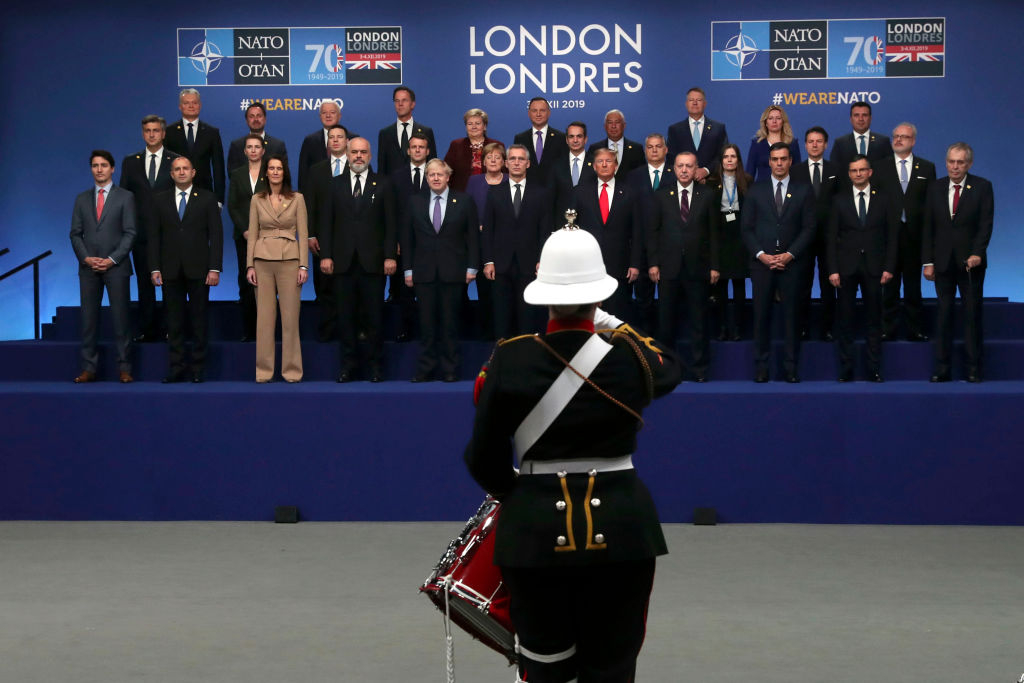by Lawrence A. Franklin
Why NATO is still relevant
- Many additional countries who joined the alliance -- such as Poland, Hungary and the Baltic States, which had been Soviet satellites -- still consider post-Communist Russia an extremely disquieting potential threat. That is just one issue that has created friction among NATO nations....
- The larger question [is] the degree to which enemy countries perceive NATO as a unified organization that would respond militarily to aggression against any member state -- a crucial psychological factor in deterrence.
- Its reason for being should not be written off quite yet...

In
the absence of cohesion and deterrence, NATO no longer would be viable
or vital. But its reason for being should not be written off quite yet.
Pictured: A group photo of the NATO leaders, taken on December 4, 2019
in Watford, England, at the NATO summit. (Photo by Steve Parsons - WPA
Pool/Getty Images)
|
The two-day summit of the North Atlantic Treaty Organization (NATO) -- held in London on December 3-4 to commemorate its 70th anniversary -- may have been marked by controversy, but the gathering constituted an important reminder of why the international alliance was established in the first place.
Founded in April 1949 by the United States, Canada, Belgium, Denmark, France, Iceland, Italy, Luxembourg, the Netherlands, Norway, Portugal and the United Kingdom, NATO was a pact created to counter the world's greatest threat at the time: the Soviet Union and its race for global domination.
At the time, it was clear that all NATO members were dependent on and deferred to American political and military leadership. Since the collapse of the Soviet Union, however, some of the original NATO member states began to seek systems that would protect their particular individual interests.
Germany, for instance, has become Europe's economic powerhouse, enjoying a favorable balance of trade with the US. France, no longer viewing Russia as an existential threat to the Free World, now seems more motivated to protect NATO's southern flank from radical Islamic terrorist groups in West Africa, and from mass migration from former French colonies in North Africa.
Meanwhile, many additional countries who joined the alliance -- such as Poland, Hungary and the Baltic States, which had been Soviet satellites -- still consider post-Communist Russia an extremely disquieting potential threat. That is just one issue that has created friction among NATO nations, particularly with Turkey's decision to purchase a Russian air defense system. Another internal bone of contention is the failure of some members to reach the minimum defense-spending level of 2% of GDP, a goal established by NATO Secretary General Jens Stoltenberg.
Other issues that NATO countries have yet unanimously to agree upon are:
- Whether China should be treated by NATO as a cooperator, competitor or adversary. Would NATO help the US if it decided to respond militarily to Chinese gunboat diplomacy?
- Whether NATO should assume the role of protector against all aggressive states, such as Iran. Would all NATO states -- now numbering 29 -- agree to assist Israel, the only democratic state in the region, in an all-out war with the Islamic Republic?
- Whether Article 5 of the NATO charter, the cornerstone of the treaty that was invoked only once in its history -- following the 9-11 attacks -- still applies. Would a Russian cyber-assault on Estonia, for example, constitute a trip-wire for a NATO response? Would all member states be willing to defend tiny Montenegro if Moscow supported one side in a civil war there, as it is doing in Ukraine?
In the absence of cohesion and deterrence, NATO no longer would be viable or vital. But its reason for being should not be written off quite yet, due to its "new overarching space policy" to "share information, increase interoperability, and ensure that [its] missions and operations can call on the support they need," and its "Readiness Initiative," according to which "by 2020, Allies will make available 30 combat ships, 30 land battalions, 30 air squadrons, to be ready within 30 days."
Dr. Lawrence A. Franklin was the Iran Desk Officer for Secretary of Defense Donald Rumsfeld. He also served on active duty with the U.S. Army and as a Colonel in the Air Force Reserve.
Source: https://www.gatestoneinstitute.org/15265/is-nato-still-vital
Follow Middle East and Terrorism on Twitter
No comments:
Post a Comment